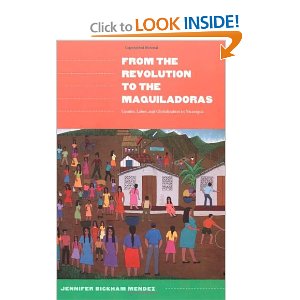From the revolution to the maquiladoras : gender, labor, and globalization in Nicaragua
Jennifer Bickham Mendez is Associate Professor of Sociology at the College of William and Mary.
The Working and Unemployed Womens Movement Maria Elena Cuadra 1
2 Oppositional Politics in Nicaragua and the Formation of MEC 25
3 Gendering Power and Resistance in an Era of Globalization 59
MECs Search for an Organizational Structure 79
MECs Political Strategies and the Free Trade Zone 133
Democracy Rights and Citizenship under Globalization 177
Power and Opposition in an Age of Globalization 205
Notes 227
Abbreviations and Acronyms 239
Bibliography 241
Index 267
Jennifer Bickham Mendez provides a nuanced ethnography that does not simply assert the gendered intricacies of local and global political-economic processes but artfully traces their unfolding in the contemporary Nicaraguan context. She reveals the organizational and discursive possibilities presented through the international feminist and human rights movements and also elucidates the constraints and tensions across local political hierarchies of organized labor, state bureaucracies, and a national/regional women’s movement fractured along class lines. Mendez’s analysis of MEC and the wider regional Network provides a powerful lens on the range of tactics, coping mechanisms, and organizational strategies currently being enacted on a stage that is simultaneously local, regional, and global.”—Carla Freeman, author of High Tech and High Heels in the Global Economy: Women, Work, and Pink-Collar Identities in the Caribbean
“This is a compelling case study of a women’s NGO organizing women workers in a Free Trade Zone in post-Sandinista Nicaragua. Jennifer Bickham Mendez’s account reveals the challenges faced by a feisty NGO trying to survive and maintain its autonomy—from capital, the state, and the good intentions of international donors. It is a testimony to the strengths, but also the fragility, of civil society in today’s struggling democracies.”—Jane S. Jaquette, coeditor of Women and Democracy: Latin America and Central and Eastern Europe
From the Publisher
"Jennifer Bickham Mendez provides a nuanced ethnography that does not simply assert the gendered intricacies of local and global political-economic processes but artfully traces their unfolding in the contemporary Nicaraguan context. She reveals the organizational and discursive possibilities presented through the international feminist and human rights movements and also elucidates the constraints and tensions across local political hierarchies of organized labor, state bureaucracies, and a national/regional women’s movement fractured along class lines. Mendez’s analysis of MEC and the wider regional Network provides a powerful lens on the range of tactics, coping mechanisms, and organizational strategies currently being enacted on a stage that is simultaneously local, regional, and global."—Carla Freeman, author of High Tech and High Heels in the Global Economy: Women, Work, and Pink-Collar Identities in the Caribbean
"This is a compelling case study of a women’s NGO organizing women workers in a Free Trade Zone in post-Sandinista Nicaragua. Jennifer Bickham Mendez’s account reveals the challenges faced by a feisty NGO trying to survive and maintain its autonomy—from capital, the state, and the good intentions of international donors. It is a testimony to the strengths, but also the fragility, of civil society in today’s struggling democracies."—Jane S. Jaquette, coeditor of Women and Democracy: Latin America and Central and Eastern Europe --This text refers to the Hardcover edition.



